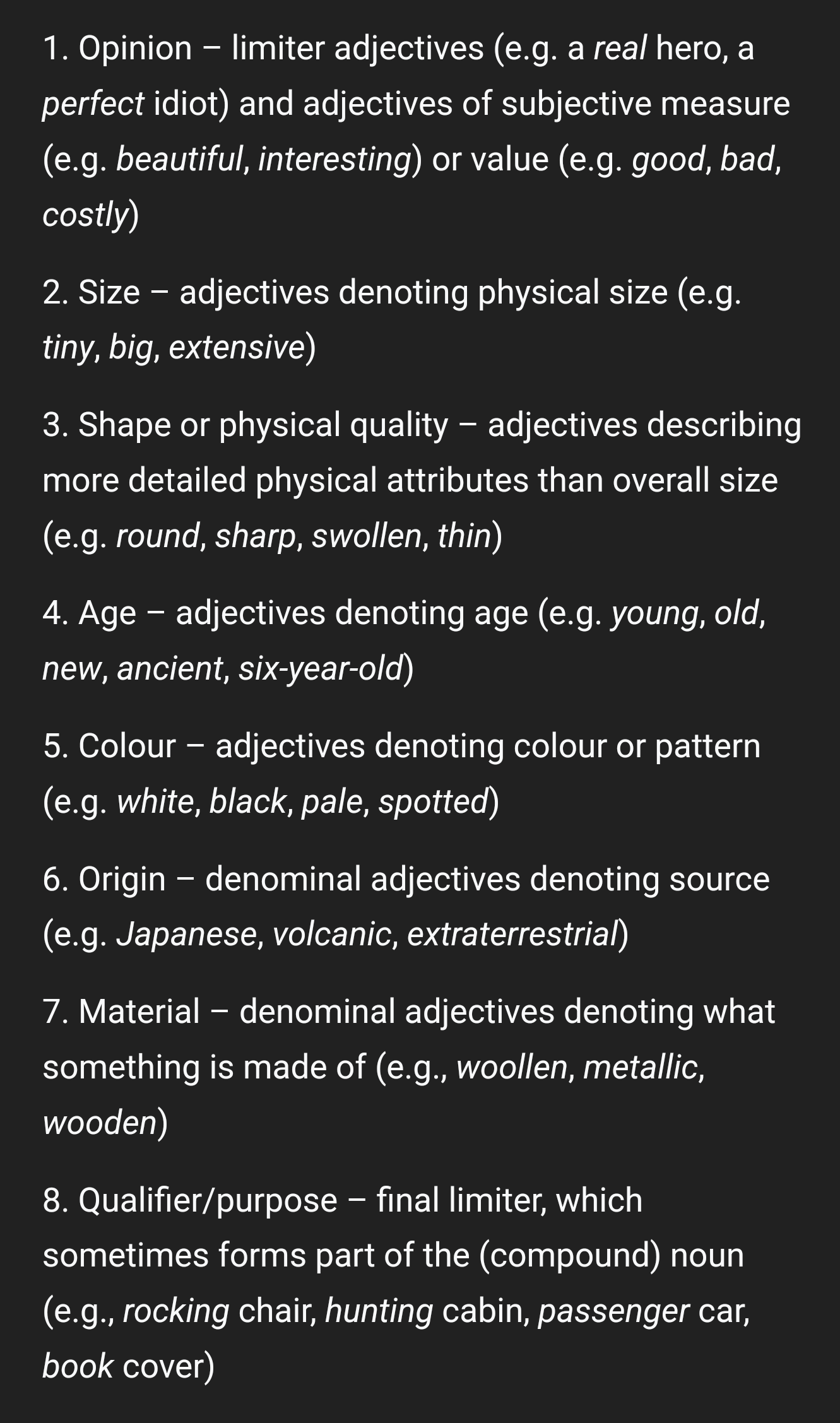Other than the gendered word usage in the original meme, I’m glad English doesn’t have a huge amount of gendered words (glares in the direction of Spanish and French).
We unfortunately make up for this though with strict word ordering. Don’t really have to conjugate and mess with gendered articles, but I can see why it’s difficult for non-native English learners to get confused. Especially when even adjective types have their own word order. To native English speakers, if the order of any of this is not correct it won’t sound right, but may have a difficult time explaining to others why it doesn’t sound right.
And gendering those words in English is optional, unlike in other languages.
German also has adjective ordering, in fact I never learned English adjective ordering because the two are close enough.
Also it’s called noun classes. “noun gender” is Indo-European-centric, it just happens to be the case that all languages of that family have three noun classes, and each of them put the words for “man”, “woman”, and “thing” in distinct ones. Otherwise noun classes have, linguistically speaking, absolutely nothing to do with gender. A woman is referred to as “she” not because she’s female but because “woman” is in the same noun class as “ship”, and men and women are in different classes because the function of classes is about short, unambiguous references and “She caressed him” would be rather ambiguous if it was “it caressed it”. Also it’s “who caressed whom”, not “who caressed who”, different topic but you can tell by the “him” instead of “he”.
I hear the hare has hair here. Hahaha.
Adjective type order rules are the best-kept secret in English, I was literally never taught this and I’ve got a degree in technical communications. XD
 (1 Opinion. 2 Size. 3 Shape or physical property. 4 Age. 5 Color. 6 Origin. 7 Material. 8 Qualifier/Purpose)
(1 Opinion. 2 Size. 3 Shape or physical property. 4 Age. 5 Color. 6 Origin. 7 Material. 8 Qualifier/Purpose)The image above transcribed:
-
Opinion – limiter adjectives (e.g. a real hero, a perfect idiot) and adjectives of subjective measure (e.g. beautiful, interesting) or value (e.g. good, bad, costly)
-
Size – adjectives denoting physical size (e.g. tiny, big, extensive)
-
Shape or physical quality – adjectives describing more detailed physical attributes than overall size (e.g. round, sharp, swollen, thin)
-
Age – adjectives denoting age (e.g. young, old, new, ancient, six-year-old)
-
Colour – adjectives denoting colour or pattern (e.g. white, black, pale, spotted)
-
Origin – denominational adjectives denoting source (e.g. Japanese, volcanic, extraterrestrial)
-
Material – denominational adjectives denoting what something is made of (e.g. woollen, metallic, wooden)
-
Qualifier/purpose – final limiter, which sometimes forms part of the (compound) noun (e.g., rocking chair, hunting cabin, passenger car, book cover)
-
I think it’s because the thing is either too obvious (if you’re native) or too specialized (if you’re a linguist). E.g. Chinese seem to also have a strict adj. order, but we only got to study it by pure chance.
I would also guess that many languages that usually don’t have a strict order will have parts that do, e.g. in Spanish it seems you may shuffle some words but not everything
Big bad wolf.
Overriden by ablaut reduplication.
Ablaut reduplication trumps adjective order
I know some of those words
Words aren’t gendered in Spanish/French/German/etc. It’s called “grammatical gender” but it’s just a way some languages differentiate words/word forms and do adjective/noun/verb agreement, it’s only sometimes loosely correlated with actual gender and is often contradictory when it’s used on living beings.
For example, many words which are used to describe women or female animals in such languages are masculine or neuter gender. Many times words for living things will have one class regardless of the actual gender.
Some grammatical gender types which might make more immediate sense are animacy (animate/inanimate, usually correlated with biotic/abiotic), human/animal/inhuman, countable vs uncountable (the difference between “a plant is here” vs “a water is here”, the second one isn’t grammatically correct in standard English because “water” is an uncountable noun, same with “furniture”, “wind”, “energy”).
A word that a lot of people prefer to use rather than “grammatical gender” is “noun class”, it more clearly conveys what the actual use of that sort of thing in language is. “Grammatical gender” is a pretty outdaded name for it, it was called that in a time where “gender” was more broadly used to mean any class/enumeration/kind/variants/etc. (it has the same root as the word “genre” if that helps it make sense). Only way after the term was coined did “gender” start to refer to what it does now.
cuz the whole goal is dehumanization
people will get mad when you misgender their dog but then happily refuse to call a trans woman a woman
You see… They sexualize those things, thats why they call them she. They are the real freaks.
Other way to look at it is that in their minds “liking things” and “having fun” is gay and feminine. But if those things are female then its not gay.
I’m beginning to think they’re just losers who’re mad that it’s not the 1940s anymore and that women having no purpose other than pumping out babies and dotting on their shitty husband isn’t something they can achieve anymore.
I wonder how much mtf hate is rooted in weak men believing that women should be subjugated and forced to serve their “purpose” and mtf women wouldn’t do that even if they could.
Nobody will fall for these losers anymore and society isn’t set up to support their desire to subjugate, they see mtf people and go “YOU MUST BE WHY NO WOMEN WILL BE MY BABY SLAVE ANYMORE!”
Calling possessions “she” is just an extension of that imho, casual leftover misogyny in language.
For the record I’m just a cis dude dating an mtf person for the last 8 months… this may be a bit of a ‘hot take’ lol - I’m learning, be gentle! 👉👈
huh didn’t think of this but makes total sense
my dumb-ass read ‘trans’ as ‘trains’ and was confused what a trains woman was
That reminds me that a friend had the DVD of Trainspotting next to his TV but I read it as Transtopping and I was very curious about the premise of the movie
I’d take that pitch. (Phrasing.) Some blatant egg starts a counseling service for ambiguously-teenage trans youth, trying to un-trans their gender through gentle conversation with a well-meaning idiot. Fully convinced it’s a thing someone can be talked out of, because they have the same energy as an ‘everybody gets those urges!’ pastor who is a Kinsey six so deep in denial they’re petting Anubis. Like a Tobias Funke situation.
Anyway the premise only works if the whole ordeal is genuinely insightful and weirdly supportive despite missing its target every single time. Group sessions have everyone taking notes on the parts intended for the other half of the room. The counselor gives great advice on How To Boy. They’re just giving it to the kids in dresses. Great fashion sense, too, and a reasonably popular webcomic about transformation magic. The latter is where the kids finally exchange glances and figure out this asshat needs their help.
You’d want a few comedic inclusions for the, uh, clientelle. One is a mildly androgynous cis guy they keep trying to talk into skirts. Somebody mixed up some paperwork. May flirt with being nonbinary, but ultimately just keeps the striped socks. Another, the service’s only success story, is a trans dude whose parents don’t speak great English. For trans youths, makes boys manlier? Sounds perfect. You want a bunch of girly shit we have in his size?
Must have been about the GOP.

actual girboss on a roll with no signs of slowing down 💅👩🦽
when the ataraxia kicks in after multi-track drifting the trolley problem
There is a surprising amount of overlap. All but one of the train people I know are transwomen. =D
It always blew my mind that boats are a She, but heaven forbid we allow any women on board, they are unlucky. Like really!?
I hunk historically that’s exactly why
Women weren’t allowed on boats but it can’t be a sausage fest, might as well make the boat feminine [citation needed]
Inference: sailors fucked boats.
Boats are a she because sailors stay in the safety of her belly for months on end. Women weren’t allowed on board because 1. Horny sailors, 2. Monthly complications, 3. A sense of chivalry and wanting to protect them from the harsh unforgiving sea, and 4. To have somebody to come home to.
Because of the implication.
gendered language is kinda whack fr like why is a computer referred to as she in some languages, but then being able to choose what gendered words I use for myself in russian is a cool way to assert dominance
Well another thing is that’s not just a simple language thing - it’s culture as well. For example, Hispanic cultures (generally) tend to have a more “conservative” mindset regarding gender and non-binarism, it’s practically nonexistent here in Spain.
I have family in Mexico who attempt to de-empasize gendered language in Spanish, but yeah there’s a lot of pushback from more conservative people, and unfortunately those conservative voices tend to be the loudest.
Interesting experiment: Ask translation software to translate “my manager”, “the cleaner”, etc. into a gendered language and see which one it chooses for each.
The correct gender-neutral translation for “cleaner” in German is “die Putzkraft”, which is female, because Kraft (force) is female, basically a “policeman” vs. “police officer” kind of situation. “Reinigungsfachkraft” in case you want to emphasise their occupational degree. Persons, too, are all female while members are neuter.
In Romanian, they have versions for both genders
both deepl and google translate gave the masculine мой instead of feminine моя, kind of expected this
Then you have Finnish which is based and doesn’t even have she/he but just hän.
being able to choose what gendered words I use for myself in russian is a cool way to assert dominance
Seconded. I started studying Spanish just a few months after coming out as trans. I’d expected all the gendered personal nouns/adjectives to make conversations with new people awkward, but not at all! It gave me the chance to tell them how to refer to me straight out instead of waiting for them to either have to ask or guess wrongly.
And hell, if using that -o suffix for myself doesn’t bring the euphoria every damn time. ¡Me encanta!
yeah its so convinient for us trans people, I’d argue english needs something like this but I’d get shit on pretty bad
Can’t bring your side chick onto your boat, bitches be crazy and all /s
If anyone does this intentionally, they’re human garbage.
It’s really easy to make the mistake sometimes, but in my experience they (trans people) are NEVER offended if it’s accidental, and they tend to assume it’s an accident. Overall, they are just incredibly tolerant. It’s those who support them that can sometimes get overly offended on their behalf.
But again, there are plenty that deliberately refuse to use the right pronouns. The is no excuse for this. Those people are cruel, and what they are doing is going out of their way to be evil.
If my guitar and car ask to be called “they” I’ll change.
The most confused but based Ally I’ve ever met
and guitars
*nervously laugh in french*
Leave her, Johnny, leave her
Oh, leave her, Johnny, leave her
For the voyage is long and the winds don’t blow
And it’s time for us to leave her
AC4 the best AC
Maybe not in the summer, if you’re closer to the equator
?? Was talking about the game
I actually found out about this sea shanty through a medley, not through Assasin’s Creed
It wasn’t this one by Home Free was it?
https://www.youtube.com/watch?v=lLGLUSzzuWU
Great acapella group.
Correct.
Rad. If you want, check out the group “voiceplay” if you dig acapella groups. They have some really cool song covers. Oogie boogie song from nightmare before christmas is a fun example.
Wait, so this is a trans instance? I was here for the memes and didn’t think too much about the rest of it
I dont know if knowyourmeme is the appropriate source for this, but there you are
https://knowyourmeme.com/memes/subcultures/ikea-blahaj-shark
On Tumblr, BLÅHAJ gained an association with the LGBTQ+ and transgender community in particular, which is reflected in multiple memes posted on both Tumblr and Reddit in the late 2010s (examples shown below, left and right). For example, on September 6th, 2021, Twitter user @TheWerelizard tweeted an official advertisement by IKEA in which BLÅHAJ was used to express support for LGBTQ+.
Edit: wow, all that time I read it as “Blajah” instead of “Blahaj”…
Edit: wow, all that time I read it as “Blajah” instead of “Blahaj”…
Worse: It’s pronounced [ˈbloːˌhaj] because Swedes are silly.
I mean, it’s spelled with å, not a
English dropping all diacretics, then getting confused about the pronunciation (who could’ve seen this coming?)
Tbh I don’t know why people say Blahaj instead of Blaahaj. The second is the “correct” way to differentiate Å and A if you don’t have diacritics. I would think it would be spelled “AO” instead since it’s literally just an A with a lowercase O on top, like how German vowel letters with umlauts (Ä Ö Ü Ÿ) are spelled with an E at the end (AE OE UE YE) when you don’t have diacritics available (since umlauts originated as a lowercase E above a letter). Or like how in Spanish the “correct” way to write Ñ without diacritics is to stick an N at the end like “NN”.* But who knows what goes on in the minds of Swedish people… I’m pretty sure most of them don’t even know that you’re allegedly supposed to write “Å” as “AA”.
*fun fact: the tilde was previously a lowercase “N” above a letter used in Latin & post-Latin Romance languages to replace a following nasal “n/m” after any letter (e.g. Latin “Manu” -> “Mãu” -> Portuguese “Mão”, Latin “Rationes” -> Portuguese/Galician “Razões”/“Rações”/“Rasões”, Latin “annus” -> Spanish “anno” -> Spanish “año”) but it has been reduced to only the letters Ñ in Spanish and Ã/Õ in Portuguese
like how German vowel letters with umlauts (Ä Ö Ü Ÿ) are spelled with an E at the end (AE OE UE YE)
There’s no Ypsilon Umlaut, in fact y basically only occurs in loanwords nowadays, it was used instead of i quite a bit in previous spelling versions and names are conservative, thus those stuck around (Bayern, Mayer, etc).
Then there’s the ß which by now at least has a capital version but the Duden still didn’t get around to changing the replacement form from ss to sz.
You also occasionally see ë ï those aren’t Umlauts but French-style diaresis, signifying that the vowel combination they’re in isn’t a diphthong. Alëuten, Piëch, Zitrön.
It’s still pronounced o, though. Why is the right pronunciation hiding on top of the a? Is it afraid to come down?
it’s shy 👉👈
So it’s Finnish?
They’re blue, white, and pink, which are also the colors on the trans pride flag. Also doesn’t hurt that they’re cute and cuddly.
I honestly had no idea since I simply didn’t look into it, just liked the memes. I get the downvote, I just didn’t mean anything negative by my comment.

…they are all masculine subjects in Spanish.
Gun would be female, no? Pistola? And boat could vary, barco or lancha, maybe.
Boat is bote, masculine.
But gun is pistola, feminine. Or arma, masculine, but that would rather be arm.
I thought that pistols was handgun xd
I guess it is but really to me a gun can be many sizes so it isn’t one to one a pistola…
Bit difficult without context.
Cruelty is the point



















